|
|
|
Sort Order |
|
|
|
Items / Page
|
|
|
|
|
|
|
| Srl | Item |
| 1 |
ID:
172314


|
|
|
|
|
| Summary/Abstract |
International treaties require ratification to go into effect. But while some treaties have high ratification rates, many do not, leading to a system where issues appear to be addressed on paper but are not in practice. This article seeks to address why treaties receive varying levels of support and finds that factors present during the negotiation phase of the agreement affect the ratification phase. Specifically, bargaining power at and away from the negotiation table influences both the substantive nature of the treaty and the extent to which it will be widely ratifiable. This article explores this issue both in a statistical analysis and in two pairs of qualitative case studies. The evidence indicates that negotiation processes cast a long shadow on the fate of international agreements leading to the current treaty system of prolific international law that is not ratified by most states.
|
|
|
|
|
|
|
|
|
|
|
|
|
|
|
|
| 2 |
ID:
172317
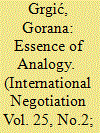

|
|
|
|
|
| Summary/Abstract |
From the perspective of Bosnia-Herzegovina (BiH) today, the legacy of the Dayton Peace Agreement (DPA) remains mixed. The dominant view is that the DPA is the origin of its political impasse, economic stagnation, and failed nation-building. Yet, it is indisputable that DPA has been successful in preventing the recurrence of a major violent ethnic conflict in BiH. More recently, the failures of Syrian peace talks to yield a durable settlement have evoked the lessons from the DPA. However, most analyses have concluded the parallels with the Bosnian war and its resolution are misplaced given the complexity and severity of the war in Syria. This article argues for a more nuanced approach to distilling the Dayton legacy, particularly when it is employed as a historical analogy. It highlights the usefulness of the DPA as an analogy for successful conflict termination, while offering lessons about the pitfalls of externally imposed consociational arrangements.
|
|
|
|
|
|
|
|
|
|
|
|
|
|
|
|
| 3 |
ID:
172322
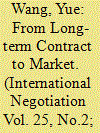

|
|
|
|
|
| Summary/Abstract |
The collapse of a long-term contract-based (LTC) benchmark system and the rise of a market-based index system in international negotiations of iron ore prices in the Asia-Pacific region has attracted much media attention. However, a systematic analysis of why and how such a change occurred from a negotiation point of view is absent. Drawing upon a relationship-behavior-conditions (RBC) perspective from the international business (IB) negotiation literature, this article investigates how negotiations between parties unfolded during the 2009–2010 period. Specifically, the article contributes to a deeper understanding of the subject by evaluating the relationships between various negotiating parties, investigating some intriguing behaviors by negotiating parties, and identifying important conditions surrounding the negotiation process. The case of iron ore price negotiation also offers a vehicle to advance the RBC perspective in untangling complex IB negotiation problems and generate some broad implications for IB negotiation research and practices.
|
|
|
|
|
|
|
|
|
|
|
|
|
|
|
|
| 4 |
ID:
172316
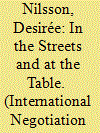

|
|
|
|
|
| Summary/Abstract |
When bringing armed conflicts to a peaceful end, the inclusion of civil society in peacemaking is a vital task. However, whereas previous research on civil society inclusion has made significant advancements, surprisingly little attention has been paid to analyzing how civil resistance and mass action may interact with more elite-driven approaches during peace processes. This study addresses this research gap by examining the interplay between elite and mass-based civil society approaches in three different peace processes in civil wars in Africa in the post-Cold War period: Liberia, the Central African Republic (CAR), and Burundi. We advance the literature by developing a framework that focuses on coordination of these different efforts and we explore this interplay empirically. With this study, we aim to broaden the research agenda, allowing for future synergies at the research frontier of mass action and the inclusion of civil society in peace processes.
|
|
|
|
|
|
|
|
|
|
|
|
|
|
|
|
| 5 |
ID:
172318
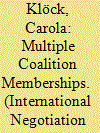

|
|
|
|
|
| Summary/Abstract |
This study explores multiple coalition memberships in multilateral negotiations, with a focus on climate negotiations. Why do countries engage in multiple coalitions, and how do multiple coalition memberships affect their influence? I argue that coalitions differ in important respects. Accordingly, countries may belong to both, long-term and short-lived coalitions; they may consciously decide to join a coalition, but also be associated by default. Finally, larger coalitions confer numerical strength, while smaller (sub-)coalitions help voice common positions. Regarding effects, I propose two perspectives. The zero-sum perspective highlights coordination costs and potentially incompatible positions, while the win-win perspective focuses on the complementarity of different coalitions and the potential for mutual support. Anecdotal evidence from the climate negotiations offers support for these perspectives, but further empirical research is needed to better understand why countries join several coalitions, how they navigate these multiple coalition memberships, and how these affect their influence.
|
|
|
|
|
|
|
|
|
|
|
|
|
|
|
|
| 6 |
ID:
172321
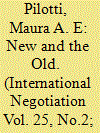

|
|
|
|
|
| Summary/Abstract |
Using a case study method, we examine how practitioners, including judges, arbitrators and community mediators, view dispute resolution in the Kingdom of Saudi Arabia (KSA). The goal of this study is to assess whether traditional approaches to dispute resolution coexist with or are discarded for imported modes. Participants were selected through convenience sampling. Structured interviews involved (a) participants’ general theoretical foundations, (b) key principles that govern their professional role, (c) their views of different roles, and (d) the extent to which traditional modi operandi persist. The results highlight the dominance of principles and practices of Sharia law over common law. Although the use of formal Western procedures was reported in commercial disputes and rarely in family and tribal matters, implementation was undeniably shaped by religious and kin-based social habits and values.
|
|
|
|
|
|
|
|
|
|
|
|
|
|
|
|
| 7 |
ID:
172315
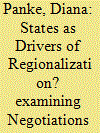

|
|
|
|
|
| Summary/Abstract |
The political regulation of the economy takes place on domestic, regional and international levels. Often, states are members of regional and international organizations (ROs and IOs) with competencies in the economic realm. This study explores the effects of such overlaps in membership and policy focus, and examines negotiations in economic Ios. It studies the phenomenon of states being drivers of regionalization of international negotiations. This analysis reveals that states make a conscious choice to influence regionalization of international economic policies. States with strong export sectors and strong economies are more inclined to act on behalf of their RO in international economic negotiations. Apart from incentives, capacities also matter. States need to have domestic and diplomatic capacities to become active in Ios in the first place.
|
|
|
|
|
|
|
|
|
|
|
|
|
|
|
|
| 8 |
ID:
172320
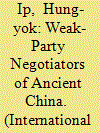

|
|
|
|
|
| Summary/Abstract |
This article situates the topic of weak-party negotiators in the context of early China. It examines the Mohists, activists known for their efforts to confront aggressive warfare in the Warring States period (476–221 BC), when various regional states competed fiercely with one another in China’s inter-state system. By examining the foundational text of Mohism, the Mozi, I show how the Mohists pioneered techniques and tactics regarded as beneficial for weak-party negotiators by modern day experts on negotiation and conflict resolution. More importantly, I emphasize that with their long and deep historical engagement with an ancient Chinese elite driven by self-interests, the Mohists pursued power and were consequential by developing their own approach to asymmetrical negotiation in war-related contexts. This approach was heavily dependent on the Mohists’ use of positive and negative leverage. And it is, according to the Mozi, made possible by the activists’ relentless pursuit of knowledge.
|
|
|
|
|
|
|
|
|
|
|
|
|
|
|
|
|
|
|
|
|